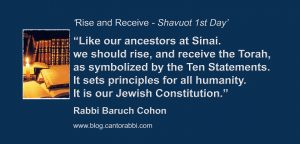RISE AND RECEIVE – Shavuot 1st day– by Rabbi Baruch Cohon
Of all our annual holidays, this week’s festival of Shavuot is by far the one most often ignored. No family gatherings like the Passover Seder, no L’chaim parties like Purim, no gift exchanges like Hanukkah, no solemn fasting like Yom Kippur. Why celebrate it at all? Just because the Torah says so?
For all who question tradition, a legitimate answer is called for. Yes, the Torah says so, in fact equating Shavuot with Passover and Succot as one of the 3 annual pilgrim festivals, timed to the agricultural seasons, that brought our ancestors regularly to the Temple in Jerusalem. But another historical event, even stronger, identifies Shavuot as supremely important. That event pre-dates the Temple, even pre-dates entering the Promised Land. It is the Revelation at Mount Sinai.
There we were, a couple million of us, ex-slaves, seven weeks out of Egypt, camped at the foot of a medium size mountain. The man who led us across the Red Sea climbed that mountain, while we waited below. Three days we waited, and we prepared. We washed our clothes. We deprived ourselves of marital relations. We even stayed outside the boundary of the mountain itself, as Moses warned us to be careful not to touch that mountain. For this event, it would be sanctified to G-d. On the third day we heard thunder, we saw lightning, smoke and fire from the top of the mountain – and the mighty blast of a great shofar.
And then on the fourth day, Moses and Aaron climbed the mountain alone. In great awe, the rest of us stayed below. And we heard a voice – a super human voice that no nation ever heard before. Or since that day. We heard the Ten Commandments, spoken aloud, directly from their Divine Source. That fourth day at Mount Sinai is the day on our calendar as the First Day of Shavuot.
Only this once does our Torah describe such an event. It even tells us that the people were afraid of the Voice of G-d, so they asked Moses to go into the sacred smoke and bring them the Covenant, lest they succumb to the danger of direct Divine contact. Commentators vary in their descriptions of the event. Some insist that the entire nation heard all the Ten Statements – aseret ha-dibrot. Others maintain that Moses relayed them from #3 on. Either way, the People of Israel stood at attention and accepted their responsibility. Today, in synagogues throughout the world, once again Jews stand and listen to the Big Ten – frequently called Commandments, but literally the Ten Statements – rather an introduction to our duties as responsible human beings.
What does that responsibility include? Remember, Rabbinic tradition expands that responsibility to include all the Mitzvos – 613 total. That total number underwent changes in history, such as the necessary elimination of all the sacrificial duties after the Temple was destroyed. But the principles enunciated at Sinai remain.
This Shavuot, and next Shavuot, and every day, can we live by our famous Big Ten? If we do, we’ll be in good company, both among our fellow Jews and among people whose ancestors never stood at Sinai. How does that work?
Very simply. Those first two Statements – the ones they all heard directly, even according to all the commentators – establish Divine Authority, and rule out idolatry. The other 8 give us basic definitions of right and wrong. Contrary to the prejudices of whoever agitates to remove them from our public buildings, these Statements do not discuss religious ceremonies at all. What do they say?
Never swear falsely. “Taking the name of G-d in vain” means just that. Whether or not you place your hand on a Bible when you take an oath, that oath should be honest.
Take a day of rest once a week – for yourself and for those who depend on you.
Honor your parents. Hopefully they will deserve your respect and honor. Give them the benefit of the doubt anyway.
Do not commit murder. Remember always: lo tirtzakh does Not mean “thou shalt not kill.” Bitter as it may be, the truth is that killing is not always wrong. Witness self-defense, legal execution, and war.
Do not commit adultery. Worth considering in these days of destruction of the family.
Do not steal. Any questions there?
Do not bear false witness. Sometimes it’s called “framing” someone. Dishonesty in every form is wrong.
Do not covet. We cannot help admiring what our neighbor may have but admiring stops short of plotting how to take it away from him.
This Shavuot and every Shavuot, let’s stand to hear these principles repeated, and let’s accept them in our lives. Like our ancestors at Sinai. we should rise, and receive the Torah, as symbolized by the Ten Statements. It sets principles for all humanity. It is our Jewish Constitution.



